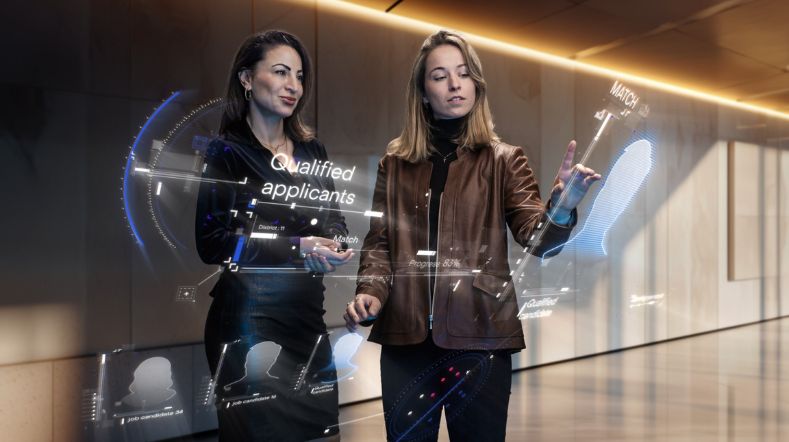
Technological developments in the workplace
For many organisations and employees, it is unclear what their work will look like in the future as a result of technological developments. This is why we are researching into how work will change in the future. We do this for sector organisations, regions, educational institutions or individual organisations. We employ different approaches that we use in joint programmes.
Technological developments are moving quickly and having a major impact on our work. Jobs are disappearing and new jobs are being created. But above all, a lot of jobs are changing. To make things even more complicated, several other developments are having an impact. The ageing population and the energy transition are just a few examples.
Tasks of the Future app
If we know what tasks will look like in the future, we can establish the extent to which these tasks match the competences and motivation of employees in an organisation. We do this with the help of the Tasks of the Future app. In a digital tool, employees indicate to what extent they wish to and are able to perform tasks of the future. This gives workers and employers an understanding of the issue: do my people have the competences to carry out the tasks of the future? Are they motivated to perform and learn these tasks?
Technology and Labour Market Monitor
We have also developed a quantitative monitor to measure the impact of technology on the labour market of various sectors. With the Technologisation and Labour Market Monitor, we map out the most important technological developments in a sector, and the impact they have on the quality of labour. Examples include work pressures or job variety. This gives us a broad, representative picture of the developments in a sector. The Monitor allows for better weighing of the potential of technology, together with the opportunities in sectors. Would you like to know more? Download the report on the Technology and Labour Market Monitor (pdf).
Beyond 4.0: Making technology, jobs and welfare work
Beyond 4.0 is a completed European project in which TNO participated. The project aims to help deliver an inclusive European future by examining the impact of the new technologies on the future of jobs, business models and welfare.
Steven Dhondt (Senior Research Scientist): "The project raised the question of what comes after Industry 4.0. Industry 4.0 represents a policy aimed at digitising our industry. The European Commission is outlining the strategy of Industrie 5.0. Our project aligns with the content of Industry 5.0, namely that work in the future should be people-centred, sustainable and resilient. The digitalisation of work should not only focus on efficiency, but should aim to improve work."
Beyond 4.0 is focused to examine the impact of technological transformation on value creation by companies, education and training, skills needs and quality, content and distribution of work. All these focus points contribute to determine social investment approaches and tools for inclusive growth.
The project also aims to identify policy options for policy welfare and fiscal policy to provide new scientific insight into technological transformation. To eventually bring new scientific understanding into company strategies dealing with technological transformation.
Work via digital platforms
Matching the labour supply and demand via digital platforms (such as Uber and Deliveroo) has implications for labour relations, income security and the working conditions of employees. Each sector now has its own platform(s). There is Helpling in the cleaning sector, Temper in the hospitality sector, and Werkspot in construction .
Each platform organises the work in its own way. The platform organisations, the type of work done via the platforms, and the platform workers themselves all vary. It’s important to have a clear picture of this diversity, and to use it as input for the social debate on platform work and potential policy measures. Therefore, we are mapping the impact of digital platforms on the quality of work of platform workers. Would you like to know more? Download the literature review on the possible impact (pdf) (pdf).
By understanding how work changes within sectors, regions, organisations and specific tasks, organisations can make informed choices when introducing new technical applications. In addition, employees can use their role to influence technology and prepare for the new opportunities. Sector organisations can effectively support their members. And educational institutions can train students for the work of tomorrow.
OpenInnoTrain
OpenInnoTrain is a knowledge transfer project focused on open innovation and research translation between academia and industry with a 22-member research consortium across several countries. The project aims at enabling the untapped potential of European university researchers in getting their research outcomes to the market within the University‐Industry Cooperation (UIC) framework in the sectors of FinTech, Industry 4.0, CleanTech and FoodTech. This Open Innovation approach for research translation is the prerequisite for societal impact through value creation by embedding research‐generated knowledge into practices, transforming knowledge made available in academic publications to new or improved products and services and behavioural changes. OpenInnoTrain is a Marie Skłodowska-Curie Research and Innovation Staff Exchange and has received funding from the European Union’s Horizon 2020 Research and Innovation programme under Grant Agreement number 823971. TNO's role in the knowledge project is to strengthen cooperation and networks with partners in the field of Industry4.0. TNO works on EU projects in the field of smart working, workplace innovation and digitization. This concerns issues at the intersection of new technology and social innovation on the one hand, and the future of work and new forms of organization on the other.
More information? Visit the project website.
Get inspired
TNO Announces the launch of ObjectivEye


Prospective Life Cycle Assessments for future-proof product design


Knowledge advantage in SSbD offers opportunities for Dutch chemical companies


The future of chemicals is Safe and Sustainable by Design


SSbD presents significant opportunities for the Dutch chemical sector to maintain its leadership position


